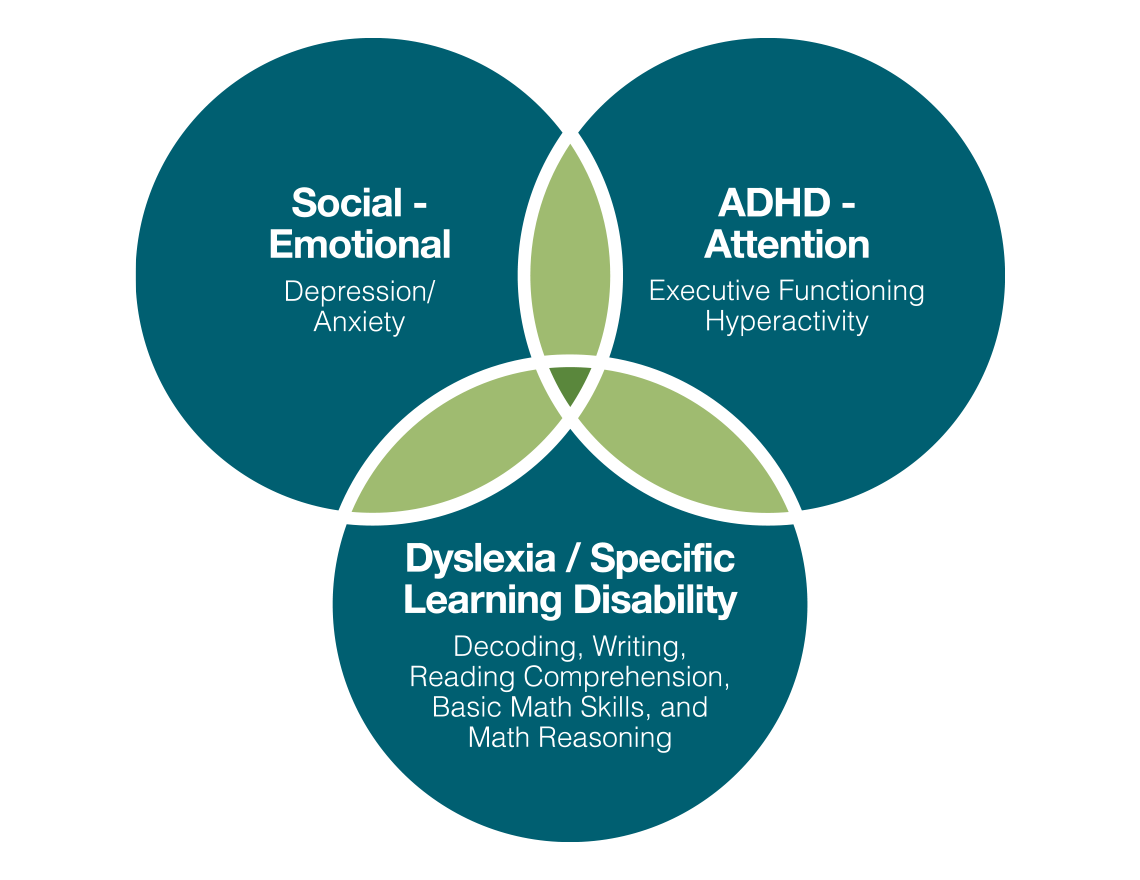QWERTY Education Services provides learning differences and ADHD screening for students of all learning styles and ages, including college students and adults.
Why Consider Learning Differences and ADHD Testing?

What To Expect From Learning Differences and ADHD Screening
Learning Differences and ADHD Testing is a process of discovery and may include academic, cognitive, and even neuropsychological batteries. We examine test data using national norms to learn — how a student is doing compared to other students who are the same age — and, often more interestingly, what strengths and learning challenges might lie within an individual’s own profile.
VIRTUALLY EVERYONE THAT WE TEST BENEFITS FROM THE EXPERIENCE.
Our specialists review prior Learning Differences and ADHD Testing and other existing information to determine the best way to answer the questions you may have.
An educational psychologist and/or credentialed learning specialist will work one-on-one with you or your child, usually testing for between two and eight hours (broken into sessions as needed).
After testing and scoring is completed, we create a comprehensive written report, i.e. a “psychoeducational evaluation,” that weaves together testing results, observations, and other information to create a robust picture of your or your child’s learning profile.
Our team carefully explains why certain academics-related tasks may be challenging and how you or your child can use the strengths in the profile to learn ways to make learning easier and more effective.
We also make specific recommendations and referrals as needed.
What Kind of Testing is Right?
QWERTY’s specialists combine careful information gathering, including
collaboration with your child's school team and a classroom observation when appropriate, and significant clinical and educational expertise to create a custom battery of the right tests to answer your questions. Test selection remains flexible as information emerges during the assessment process.
Testing can range from basic academic skills benchmarking to
comprehensive assessments for diagnosing learning differences, including dyslexia and other challenges such as ADHD and ASD.
SOME EXAMPLE TESTING OBJECTIVES MIGHT BE:
Identify areas for support and enrichment by examining progress in school-related areas such as reading, writing and mathematics.
Understand core strengths and weaknesses related to thinking, reasoning, working memory, verbal comprehension & processing speed.
Examine processing measures (auditory, visual, motor, executive functioning, memory, processing speed).
Evaluate neuropsychological measures in the context of developmental history, behavior, and social-emotional functioning.
Free Initial Consultation
To speak with our Director of Learning Differences and ADHD Testing, call (650) 479-4745 or use the contact form below to arrange a no-cost telephone consultation to discuss your questions, concerns, and education goals. You can also call for information about our other services at (650) 434-2163.

Learning Differences and ADHD Testing Preliminary Information
If you have spoken with us and have decided to pursue learning differences and ADHD testing, please complete the preliminary questionnaire and the information forms here.
Learning Differences and ADHD Testing Information Form
Learning Differences and ADHD Testing Questionnaire
Benefits of Testing for Learning Differences and ADHD
OUR CLIENTS ARE CURIOUS ABOUT THE WORLD — AND THEMSELVES
Many seek testing because they’ve been struggling in school. They may feel frustrated or worried. They may be asking questions like “Do I have dyslexia?” or “Is this because I may have ADHD?” School problems can often lead to conflict and stress within the family.
Others come to us as they are getting ready for kindergarten or college, or as adults that are already finished with school. They may have worked with an educational psychologist before and be looking for updated insight. All are seeking to better understand their own learning strengths and challenges.
What Testing Can Do For You
ANSWER QUESTIONS
Does my child have a learning difference, such as dyslexia?
What is my student's learning style?
Does my child have ADHD, even when they... can read or play video games for hours? may or may not seem overly active? seem extremely bright?
PROVIDE DECISION-DRIVING DATA
Provide data to inform recommendations and strategies to address areas of concern in learning.
Provide data for certain private school admissions decisions
INFORM FUTURE LEARNING STRATEGIES
Facilitate school programs and services to support or enrich core challenges and strengths
Determine eligibility for Special Education/504 services and accommodations
Document a student’s need for appropriate accommodations for standardized testing, i.e. SAT or ACT
HELP STUDENTS WITH SELF-ESTEEM
Gain confidence from improved self-awareness
Learn to take pride in their strengths and understand their challenges
Learn that the important question is not, “Am I smart?” but rather, “What are my learning strengths and challenges?”

